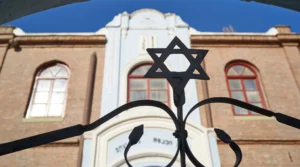By Andrew Lapin
(JTA) – At least two synagogues in California evacuated during Shabbat services over the weekend as online tro
lls targeted Jewish congregations for the fourth straight week with fake bomb and other security threats.
At least 26 congregations in 12 states have received the threats, according to the Anti-Defamation League, which is raising alarm about the barrage. The organization believes the instigators are selecting their targets based on the availability of livestreamed services and other events, motivated by their desire to watch the congregations react to the threats in real time.
“This is what happens when individuals coalesce around their hatred of Jews and use technology to try to optimize that,” Oren Segal, vice president of the ADL’s Center on Extremism, told the Jewish Telegraphic Agency.
The two California synagogues that evacuated in response to the threats were Temple Beth Torah, a Reform congregation in Fremont, which emptied its building on Friday evening, and Temple Beth Tikvah, a Reform congregation in Fullerton, which did the same during Saturday services. Both had received anonymous phoned-in bomb threats.
Beth Tikvah’s Facebook livestream captures the moment that the threat made its way to the prayer leaders. “I am afraid that we need to stop and leave the building right now,” Rabbi Mati Kirschenbaum says after placing one hand on the shoulder of Cantor Shannon McGrady Bane, causing her to stop singing. She nods, removes her headset and exits the camera’s view as a message goes up for viewers: “Coverage will be stopping.”
Temple Beth Torah and Temple Beth Tikvah did not return requests for comment Monday.
The wave of threats has also targeted two ADL offices and other religious congregations, including African-American churches. But the activity seems primarily motivated by antisemitism, Segal said, citing what he called “lowbrow and classic antisemitism” in the language used in the phone calls. The perpetrators do not seem to be connected to any larger antisemitic groups, he said.
Synagogues and other Jewish institutions have weathered previous waves of false threats, including a spate of bomb threats at day schools Jewish community centers in 2017 that was later attributed to a Jewish teenager in Israel and, in early 2020, emailed threats to Jewish community centers that were deemed not to be credible, but not before they caused disruptions in 23 states.
Segal said that even as antisemitic harassment has become a frequent problem for synagogues over the last few years, the sustained nature of this current campaign “is a level beyond what is normal.”
The increase in the number of synagogues streaming their services since the pandemic has created a new frontier for disruption. (A watershed moment in the streaming of U.S. synagogues came in January 2022, when an armed man took a rabbi and three congregants hostage in a Texas synagogue whose service was being streamed.)
While the ADL does not recommend that congregations stop streaming their services, Segal said synagogue leadership should be aware that “bad actors” may seek to manipulate them, especially heading into the High Holidays.
“What makes this different is that this is a particular campaign using tools that many of us take for granted but that we can see are weaponized,” he said. “As people go into the High Holidays, it’s just another thing to be concerned about and to be prepared for.”





